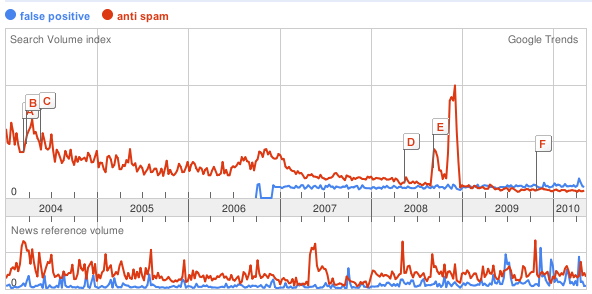 Can you remember the most valuable email you had ever received?
Can you remember the most valuable email you had ever received?
In a recent study on the business applications email, most respondents can even estimate the value of that email, for which we’ve calculated the average value as being $11.86 million.
Ever wonder what might have happened if you'd never received that message? What if the respondent didn’t know that they hadn’t received it? That would make the email in question a ‘false-positive.’
False-positives greatly reduce confidence and satisfaction with email experience. They occur when legitimate email messages (aka ham) are attacked by anti-spam measures. Attacked means deleted, quarantined or edited which are the most frequent administrative policies of anti-spam measures. Is it appropriate for messages like these to be filtered out of the business process simply because they met some content rule defined by an algorithm?
Do we have to put up with that?
Most anecdotes of most valuable email were purchase orders, negotiation documents or bid proposal documents necessary to win or fulfill terms of commercial contracts. Quite a few were over $20 million. One participant explained that the bid required email submission as the only channel for official bid response.
Clearly technologies that interrupt this workflow, cause retransmissions, delays and lost business in the course of doing its function, are not serving users well at all. They are certainly not serving the business well. In fact, our research shows that in addition to the risk of interfering with commerce, it actually happens that false-positives leads to lost business since more than a third of companies have lost business because the email did not arrive, or the recipient did not receive it.
Of course, not all missing messages get trapped in the anti-spam filters. But, since there is a broad email server compliance with mail rejection notices, anti-spam attack and false-positive processing remains the biggest likely source of missing communiques. A frequent manual solution to the non-arrival of anticipated email is the resend request. Our research shows that on average, every user participates in at least one message resend request each week. Of course, resend requests are made only for those messages that you know you didn’t get or can’t find. What about the messages you didn’t know you didn’t get?
No doubt, some of these might have been ‘most-valuable emails’ too. That’s why we have a false-positive epidemic. False-positives have real consequences: frequent resend requests delays business, and since 36% of firms had lost business because a message didn’t arrive that they knew about. This consequence of false-positives could actually be much higher, since respondents don’t know about messages they don’t know about.
ADDED NOTE June 20, 2007:
We've also posted each of the monetized answers in our comments category.










